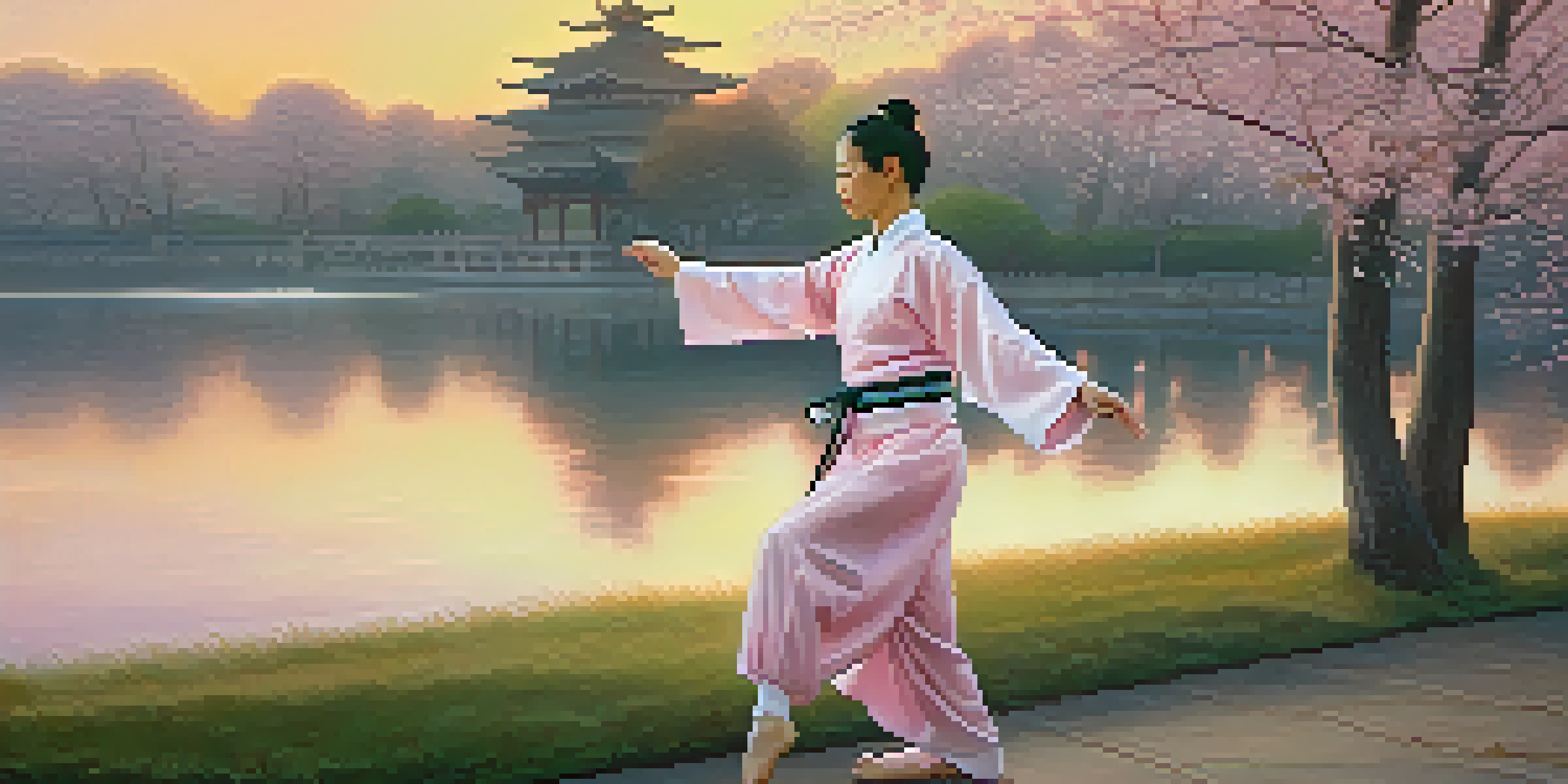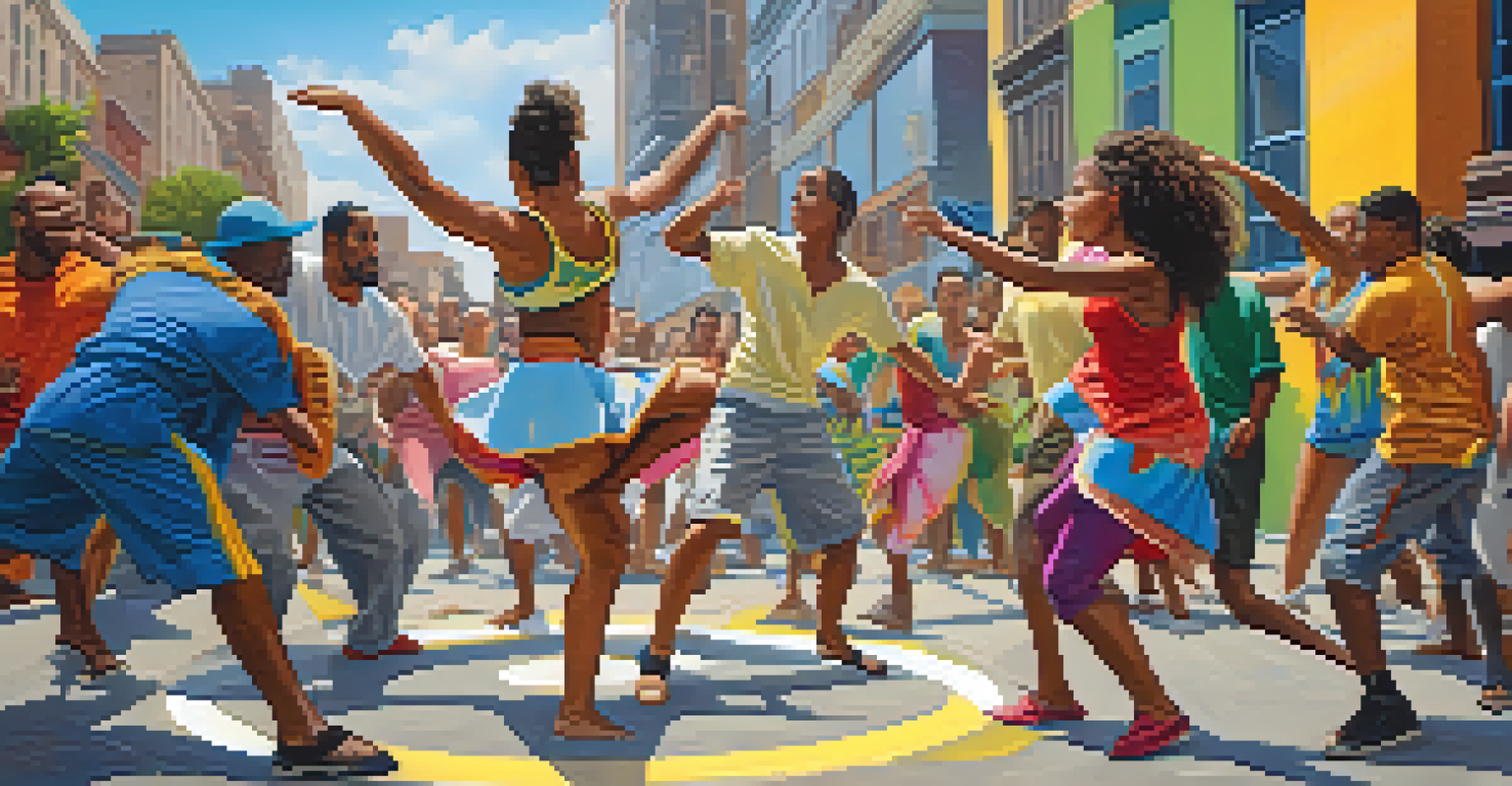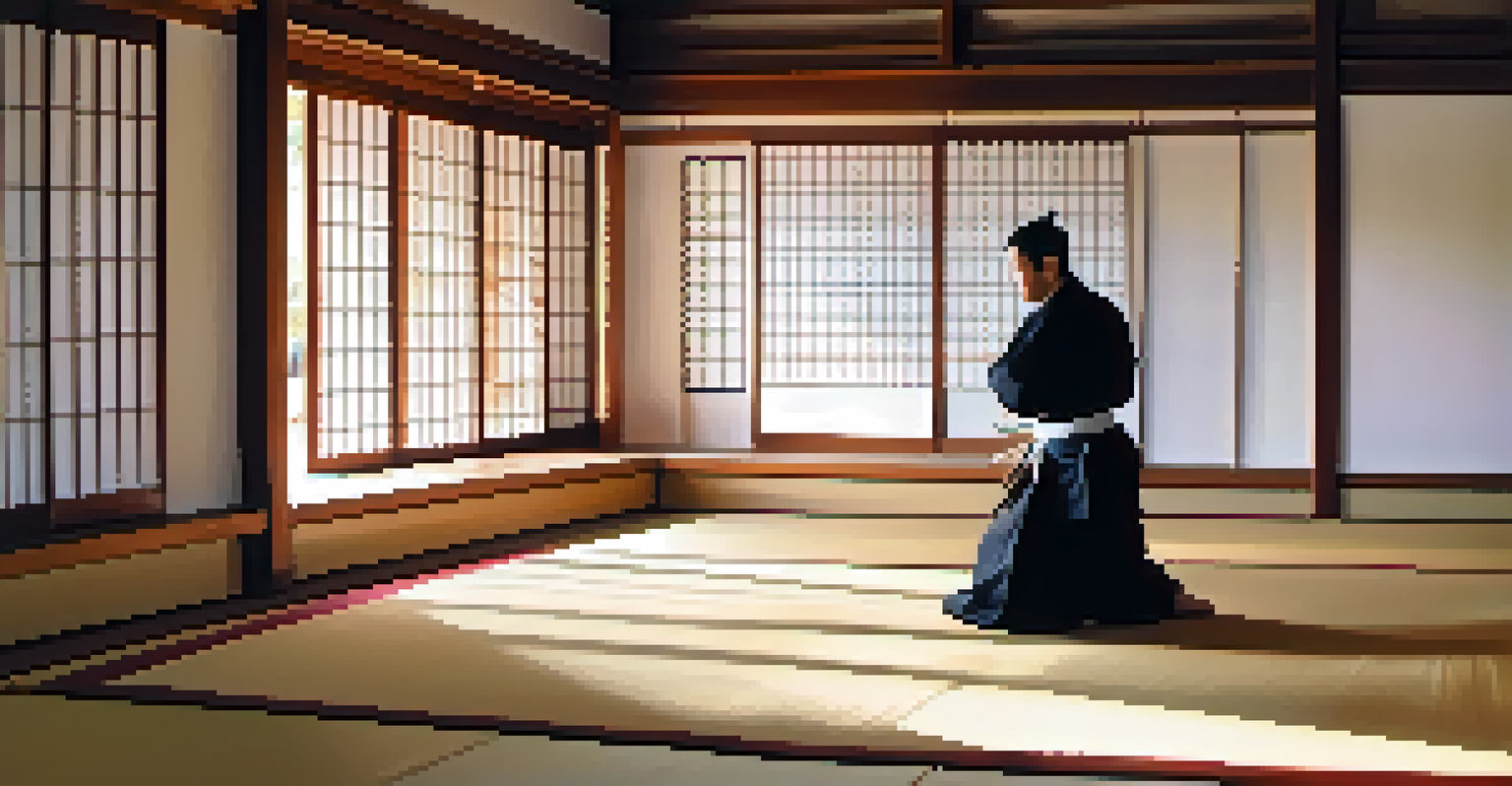Cultural Influence on Martial Arts and Movement Philosophy

Understanding Martial Arts as Cultural Expressions
Martial arts are not just physical disciplines; they are rich cultural expressions. Each style reflects the history, values, and philosophies of its origin. For instance, the graceful movements of Tai Chi mirror the principles of Chinese philosophy, emphasizing balance and harmony.
Martial arts is not about the defeat of the opponent, but the victory of oneself.
Similarly, Brazilian Jiu-Jitsu showcases the Brazilian culture's emphasis on community and adaptability. As practitioners roll on the mat, they engage in a dance that tells a story of resilience and strategy. These cultural narratives make martial arts a profound way to connect with a community's ethos.
By understanding martial arts as cultural expressions, we can appreciate the deeper meanings behind each technique and practice. It allows us to see beyond the physicality and recognize the philosophy that informs these movements.
Historical Context and Its Impact on Martial Arts
The history of martial arts is intertwined with the socio-political climate of various cultures. For example, the samurai warriors of Japan practiced Kendo, which was influenced by the bushido code—a set of principles that emphasized honor and discipline. This historical context shapes how the martial art is practiced today.

As cultures evolve, so too do their martial arts. In the 20th century, Western influences led to the popularization of mixed martial arts (MMA), merging techniques from various disciplines. This evolution reflects a globalizing world where cultural exchange enriches martial practices.
Martial Arts Reflect Cultural Values
Each martial arts style embodies the history and philosophies of its culture, offering insights into community values and traditions.
Understanding this historical context helps practitioners appreciate the roots of their art and the values it embodies. It also encourages a deeper respect for the traditions that have shaped these movements over centuries.
Philosophical Foundations of Movement in Martial Arts
At the heart of many martial arts lies a philosophical foundation that informs how practitioners move. For instance, the concept of 'flow' in Aikido teaches practitioners to move in harmony with their opponent's energy rather than against it. This principle promotes a sense of unity and understanding in combat.
The ultimate aim of martial arts is not having to use them.
Similarly, the practice of yoga, with its roots in ancient Indian philosophy, emphasizes mindfulness and body awareness. This focus on the mind-body connection can enhance martial arts training by fostering a greater understanding of one's movements and intentions.
These philosophical foundations not only guide physical movements but also instill valuable life lessons. They encourage practitioners to embody principles such as patience, resilience, and adaptability—qualities that extend far beyond the dojo or training space.
Cultural Rituals and Their Role in Martial Arts
Rituals play a significant role in many martial arts, serving to instill discipline and respect for the art. In Karate, bowing before entering the dojo is a ritual that signifies respect for the space and its traditions. This simple act reflects the deep-rooted cultural values that permeate martial training.
Similarly, the practice of ceremonies in Capoeira highlights the importance of community and celebration in Brazilian culture. These rituals not only enhance the sense of belonging but also help preserve the art's cultural heritage through generations.
Globalization Shapes Martial Practices
The rise of globalization has led to a fusion of martial arts techniques, creating new hybrid forms while posing challenges to traditional practices.
By understanding and participating in these rituals, practitioners cultivate a deeper connection to their art. It reinforces the idea that martial arts are not just about physical prowess but also about community, respect, and cultural legacy.
The Influence of Globalization on Martial Arts
Globalization has significantly influenced how martial arts are practiced and perceived worldwide. With the rise of the internet and social media, martial arts styles that were once localized are now accessible to a global audience. This exposure leads to a blending of techniques and philosophies, creating hybrid forms of martial arts.
For example, the popularity of MMA has encouraged practitioners to explore and incorporate techniques from various disciplines, transcending cultural boundaries. This fusion can lead to innovative practices that continue to evolve as they draw from diverse cultural influences.
While globalization can enrich martial arts, it also poses challenges, such as the potential dilution of traditional practices. It’s essential for practitioners to remain aware of their roots while embracing the opportunities that come with cultural exchange.
Martial Arts as a Reflection of Cultural Identity
For many practitioners, martial arts serve as a reflection of their cultural identity. This connection can be particularly strong for individuals who practice traditional styles, such as Kung Fu or Taekwondo, which are deeply rooted in their respective cultures. The techniques, rituals, and philosophies embody the values of their heritage.
Additionally, martial arts can provide a sense of belonging for those navigating multicultural environments. By engaging in a specific discipline, practitioners can connect with others who share similar cultural backgrounds or interests, fostering a sense of community and identity.
Future Trends in Martial Arts Training
Emerging trends like technology integration and a focus on mental wellness are reshaping martial arts, ensuring they remain relevant and meaningful.
Recognizing martial arts as a reflection of cultural identity can enhance the training experience. It encourages practitioners to honor their roots while also embracing the diverse influences that enrich their practice.
The Future of Martial Arts and Movement Philosophy
As we look to the future, the intersection of culture and martial arts will continue to evolve. Emerging trends, such as the integration of technology in training, present new opportunities for practitioners to enhance their skills while staying connected to their cultural roots. Virtual classes and online communities are redefining how martial arts are learned and shared.
Moreover, the growing awareness of mental health and wellness is prompting a shift in focus from purely physical techniques to holistic approaches that encompass emotional and psychological well-being. This evolution aligns with many traditional philosophies that emphasize the mind-body connection.

Ultimately, the future of martial arts will likely reflect a tapestry of global influences while remaining grounded in cultural heritage. By embracing this evolution, practitioners can ensure that martial arts continue to be a meaningful expression of cultural identity and personal growth.